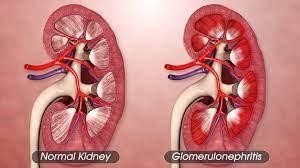RN HESI NUTRITION
RN HESI NUTRITION ( 49 Questions)
A client with glomerulonephritis is preparing for discharge and asks the nurse which kind of diet to follow upon returning home. Which dietary teaching should the nurse include in the discharge instructions?
Following low carbohydrate diet with low glycaemic index foods is incorrect. This recommendation is not specifically related to the management of glomerulonephritis. While managing carbohydrate intake might be relevant for individuals with diabetes, it's not the primary focus for someone with kidney inflammation.
Eating a high protein diet three times a day is incorrect: While protein is important for overall health and recovery, a high protein diet might not be the best recommendation for someone with compromised kidney function. Excessive protein intake could potentially put additional strain on the kidneys.
Avoiding foods high in potassium is correct. Examples of foods high in potassium that the client should be cautious about include bananas, oranges, potatoes, tomatoes, spinach, and other fruits and vegetables. Glomerulonephritis is a condition involving inflammation of the glomeruli in the kidneys, which can affect kidney function and the regulation of electrolytes, including potassium. In glomerulonephritis, the kidneys might have difficulty filtering and excreting excess potassium, leading to a potential build-up of potassium in the blood (hyperkalaemia).
Restricting sodium rich foods and excessive oral fluids is incorrect. This recommendation aligns more closely with managing fluid retention and blood pressure, which can be relevant for individuals with kidney issues. However, the primary concern in glomerulonephritis is often potassium balance, making the recommendation to avoid high potassium foods more pertinent.
Choice A
Following low carbohydrate diet with low glycaemic index foods is incorrect. This recommendation is not specifically related to the management of glomerulonephritis. While managing carbohydrate intake might be relevant for individuals with diabetes, it's not the primary focus for someone with kidney inflammation.
Choice B
Eating a high protein diet three times a day is incorrect: While protein is important for overall health and recovery, a high protein diet might not be the best recommendation for someone with compromised kidney function. Excessive protein intake could potentially put additional strain on the kidneys.
Choice C
Avoiding foods high in potassium is correct. Examples of foods high in potassium that the client should be cautious about include bananas, oranges, potatoes, tomatoes, spinach, and other fruits and vegetables. Glomerulonephritis is a condition involving inflammation of the glomeruli in the kidneys, which can affect kidney function and the regulation of electrolytes, including potassium. In glomerulonephritis, the kidneys might have difficulty filtering and excreting excess potassium, leading to a potential build-up of potassium in the blood (hyperkalaemia).
Choice D
Restricting sodium rich foods and excessive oral fluids is incorrect. This recommendation aligns more closely with managing fluid retention and blood pressure, which can be relevant for individuals with kidney issues. However, the primary concern in glomerulonephritis is often potassium balance, making the recommendation to avoid high potassium foods more pertinent.

